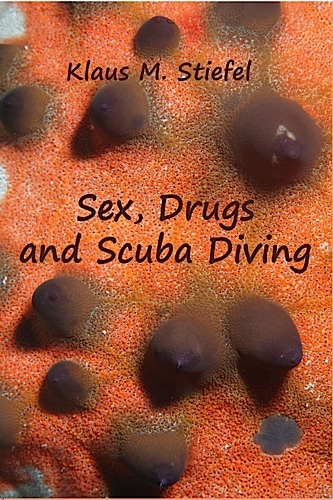Sex, Drugs and Scuba Diving released

Wetpixel member Dr. Klaus Stiefel has published a humorous guide to the secret life of marine creatures entitled “Sex, Drugs and Scuba Diving”. In his book, he answers questions as diverse as: “Has a manta ray a bigger brain than a chimpanzee? Is the disproof of god’s existence found in the butt of a sea cucumber? Are sharks merciless killers of men, or is it the other way around? Isn’t diving what we as a species really always wanted to do? How did the Vietnamese capture an island held by the Filipinos with the help of pretty girls? What is the right mindset to take photographs under water?”
The book is available now at $29.90 from Amazon and other retailers.
Frank, humorous guide explores secret life of marine creatures.
Scuba-diving neurobiologist Dr. Klaus M. Stiefel explains ocean life with tongue-in-cheek humor and stunning underwater photographs in “Sex, Drugs and Scuba Diving.”
SYDNEY – In “Sex, Drugs and Scuba Diving” (ISBN 1475146892) by Dr. Klaus M. Stiefel, the neurobiologist shows off the fascinating world of marine life he discovered during his years of scuba diving. Combining popular science with off-kilter humor, Stiefel explains the living world underwater with tongue-in-cheek humor and true-life stories.
Has a manta ray a bigger brain than a chimpanzee? Are sharks merciless killers of men, or is it the other way around? Drawing on his research and his extensive dives in remote locales from Cuba and Japan to Africa and Australia, Stiefel relates some eccentric tales about how life really functions in the world of the ocean. Also, the text is accompanied by more than 100 underwater photographs he took on his adventures. Depicting everything from the tiniest gobies to the most gargantuan manta rays, Stiefel’s pictures illuminate the kaleidoscopic world he has come to know beneath the water’s surface.
“Sex, Drugs and Scuba Diving” gives the reader a colorful picture of what life looks like 100 meters below the surface of the Pacific Ocean. He explores the strange anatomy of the curious sea cucumber and irreverently asks whether the endpoint of its digestive system is an insult to the notion of God. He ponders humanity’s long history and fascination for underwater diving and shows the steely mindset required to photograph while diving in coral reefs and tidal flats. His book is full of off-beat travel writing recounting his adventures to exotic locales. He even recalls how a sun-drenched Filipino diving island was once seized by Vietnamese troops with the help of pretty girls.
“Sex, Drugs and Scuba Diving” is a book that will appeal to scuba divers, students of marine biology, natural historians and anyone who really wants to know what goes on underneath the surface of the sea.
“Sex, Drugs and Scuba Diving” is available for sale online at Amazon.com and other channels.
About the Author: Born in 1972, Dr. Klaus M. Stiefel grew up in Austria and studied biology at the University of Vienna. He earned a doctorate in neurobiology from the Max Planck Institute for Brain Research in Frankfurt, Germany. As a teenager in Sicily, he was certified in scuba diving and has spent much of the past two decades diving in remote locations from an Austrian alpine lake to the Great Barrier Reef to the Pacific coast of Mexico to Japan’s Izu peninsula. His underwater photography has been published in several magazines.